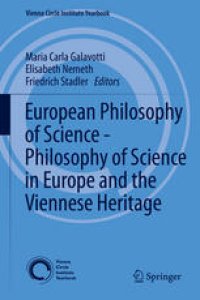
Ebook: European Philosophy of Science – Philosophy of Science in Europe and the Viennese Heritage
- Tags: Philosophy of Science, History of Philosophy, Modern Philosophy
- Series: Vienna Circle Institute Yearbook 17
- Year: 2014
- Publisher: Springer International Publishing
- Edition: 1
- Language: English
- pdf
This volume combines the theoretical and historical perspective focusing on the specific features of a European philosophy of science. On the occasion of the 20th anniversary of the Institute Vienna Circle the Viennese roots and influences will be addressed, in addition. There is no doubt that contemporary philosophy of science originated mainly in Europe beginning in the 19th century and has influenced decisively the subsequent development of globalized philosophy of science, esp. in North America. Recent research in this field documents some specific characteristics of philosophy of science covering the natural, social, and also cultural sciences in the European context up to the destruction and forced migration caused by Fascism and National Socialism. This European perspective with the integration of history and philosophy of science and the current situation in the philosophy of science after the transatlantic interaction and transformation, and the “return” after World War II raises the question of contemporary European characteristics in the philosophy of science. The role and function of the renowned Vienna Circle of Logical Empiricism and its impact and influence on contemporary philosophy of science is on the agenda, too. Accordingly, the general topic is dealt with in two parallel sessions representing systematic-formal as well as genetic-historical perspectives on philosophy of science in a European context up to the present.
This volume combines the theoretical and historical perspective focusing on the specific features of a European philosophy of science. On the occasion of the 20th anniversary of the Institute Vienna Circle the Viennese roots and influences will be addressed, in addition. There is no doubt that contemporary philosophy of science originated mainly in Europe beginning in the 19th century and has influenced decisively the subsequent development of globalized philosophy of science, esp. in North America. Recent research in this field documents some specific characteristics of philosophy of science covering the natural, social, and also cultural sciences in the European context up to the destruction and forced migration caused by Fascism and National Socialism. This European perspective with the integration of history and philosophy of science and the current situation in the philosophy of science after the transatlantic interaction and transformation, and the “return” after World War II raises the question of contemporary European characteristics in the philosophy of science. The role and function of the renowned Vienna Circle of Logical Empiricism and its impact and influence on contemporary philosophy of science is on the agenda, too. Accordingly, the general topic is dealt with in two parallel sessions representing systematic-formal as well as genetic-historical perspectives on philosophy of science in a European context up to the present.
This volume combines the theoretical and historical perspective focusing on the specific features of a European philosophy of science. On the occasion of the 20th anniversary of the Institute Vienna Circle the Viennese roots and influences will be addressed, in addition. There is no doubt that contemporary philosophy of science originated mainly in Europe beginning in the 19th century and has influenced decisively the subsequent development of globalized philosophy of science, esp. in North America. Recent research in this field documents some specific characteristics of philosophy of science covering the natural, social, and also cultural sciences in the European context up to the destruction and forced migration caused by Fascism and National Socialism. This European perspective with the integration of history and philosophy of science and the current situation in the philosophy of science after the transatlantic interaction and transformation, and the “return” after World War II raises the question of contemporary European characteristics in the philosophy of science. The role and function of the renowned Vienna Circle of Logical Empiricism and its impact and influence on contemporary philosophy of science is on the agenda, too. Accordingly, the general topic is dealt with in two parallel sessions representing systematic-formal as well as genetic-historical perspectives on philosophy of science in a European context up to the present.
Content:
Front Matter....Pages 1-8
From the Vienna Circle to the Institute Vienna Circle: On the Viennese Heritage in Contemporary Philosophy of Science....Pages 9-32
A Matter of substance? Gaston Bachelard on chemistry’s philosophical lessons....Pages 33-44
Carnap’s Aufbau and Physicalism: What Does the “Mutual Reducibility” of Psychological and Physical Objects Amount to?....Pages 45-56
On the Relationship between Neuroscience and Philosophy: the Case of Sleep and Dreaming....Pages 57-65
(Anti-)Metaphysics in the Thirties And Why Should Anyone Care Now?....Pages 67-76
Probabilistic Epistemology: A European Tradition....Pages 77-88
Reductionism Today....Pages 89-101
Betting Interpretation and the Problem of Interference....Pages 103-115
Mathematics and Experience....Pages 117-129
GÖdel and Carnap Platonism Versus Conventionalism?....Pages 131-158
What is the Status of the Hardy-Weinberg Law within Population Genetics?....Pages 159-172
Kazimierz Twardowski and the Development of Philosophy of Science in Poland....Pages 173-182
Vienna Circle on Determinism....Pages 183-195
Infinite Idealizations....Pages 197-210
Political Polyphony Otto Neurath and Politics reconsidered....Pages 211-222
Kelsen’s Legal Positivism and the Challenge of Nazi Law....Pages 223-240
Biased Coins A model for higher-order probabilities....Pages 241-248
Is Logical Empiricism Compatible With Scientific Realism?....Pages 249-262
Does the Unity of Science have a Future?....Pages 263-275
Is There a European Philosophy Science? A Wake-up Call....Pages 277-293
Vienna Circle Historiographies....Pages 295-318
Husserl and Gödel on Mathematical Objects and our Access to them....Pages 319-356
Logical Empiricism in Historical Perspective. Recent Works on Moritz Schlick....Pages 357-366
Back Matter....Pages 367-409